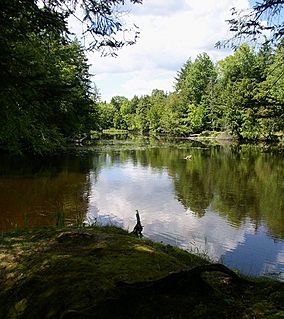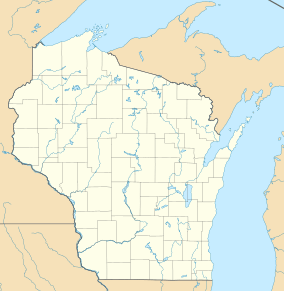Brunet Island State Park facts for kids
Quick facts for kids Brunet Island State Park |
|
|---|---|

Backwater channels at the north end of Brunet Island attract canoeists and wildlife watchers
|
|
| Location | Chippewa, Wisconsin, United States |
| Area | 1,225 acres (4.96 km2) |
| Established | 1936 |
| Governing body | Wisconsin Department of Natural Resources |
| Website | Brunet Island State Park |
Brunet Island State Park is a fun state park in Wisconsin, USA. It has a 169-acre island in the Chippewa River. The rest of the park, about 1225 acres, is on the east side of the river. This park is famous for its many white-tailed deer and tall eastern hemlock trees. You can find the park just north of Cornell in Chippewa County. It's in the Northern Highland region of Wisconsin, which is known for its forests and lakes. The Old Abe State Trail starts here and follows the river south to Chippewa Falls. You can even reach Lake Wissota State Park from this trail!
Contents
Explore Nature at Brunet Island Park
Brunet Island is special because it's where the Chippewa and Fisher Rivers meet. At the north end of the island, there are smaller, undeveloped islands formed by calm "backwater" channels. The land around the park was shaped a long time ago by huge ice sheets during the Wisconsin glaciation (the last Ice Age).
Trees and Wildlife in the Park
The park is full of mature eastern hemlock trees. However, there are a lot of deer on the island, and they eat most of the young hemlock trees. Because of this, red pines and spruces might become the main trees in the future. To protect the young trees and plants, park staff have put up small fenced areas around the island.
In 1977, a tornado hit the north-central part of the island. It knocked down trees over 18 acres of land! The park had to close until spring 1978 for cleanup. Today, this area is growing back with new birch trees.
Discover the History of Brunet Island
The park is named after Jean Brunet (1791–1877). He was a French immigrant who helped develop the upper Chippewa River area. He moved to St. Louis, Missouri in 1818 and started working for a trading company. Later, he moved to Prairie du Chien, Wisconsin and became an important person there.
Jean Brunet's Impact on the Region
In 1828, Jean Brunet moved to Chippewa Falls. He helped build the first dam and sawmill on the Chippewa River. This project was very important because it opened up the area for logging. Jean and his wife didn't have children, but they cared for a boy named Francis Gauthier like their own son. From 1837 to 1838, Brunet was part of the Wisconsin Territory legislature. After that, he moved about 25 miles upriver and settled there. He traded with local native people and ran a popular inn. The city of Cornell was even called Brunet Falls in his honor at first!
How the Park Was Created
The state of Wisconsin got Brunet Island in 1936. It was a gift from Northern States Power, which is now called Xcel Energy. The Civilian Conservation Corps (a group that helped people find work during the Great Depression) built a log shelter in 1938. Brunet Island State Park officially opened two years later, in 1940.
Fun Activities at Brunet Island State Park
There are many exciting things to do at Brunet Island State Park!
- Bicycling: You can ride your bike on the park roads and the Old Abe State Trail.
- Boating:
- There's a ramp for power boats and fishing boats. You can explore about 4 miles of the Chippewa River between two dams.
- If you like canoeing, you can rent canoes from places in Cornell and Holcombe.
- Camping:
- The South Campground has 24 sites, all with electricity.
- The North Campground has 45 simpler, "primitive" sites.
- Fishing: You can catch fish like northern pike, walleye, smallmouth bass, catfish, crappie, muskie, and yellow perch. There are fishing piers near both campgrounds.
- Hunting: Deer hunting is allowed in the northern two-thirds of the mainland part of the park.
- Sports: There's a playground and a baseball field at the picnic area.
- Swimming: Enjoy a 200-foot swimming beach on the south end of the island.
- Trails: The park has about 8 miles of hiking trails and 5 miles for cross-country skiing in winter.
- Jean Brunet Nature Trail: This hiking trail is about 0.8 miles long and has signs to teach you about nature. It starts near the bridge.
- Timber Trail: This hiking trail goes across the middle of the island, from the campground to the beach.
- Pine Trail: This hiking trail takes you through an area with many red pine trees.
- Spruce Trail: This hiking trail follows the eastern shore of the island.
- Nordic Trail: This trail is great for hiking and skiing. It loops through the part of the park on the mainland.
 | Dorothy Vaughan |
 | Charles Henry Turner |
 | Hildrus Poindexter |
 | Henry Cecil McBay |



